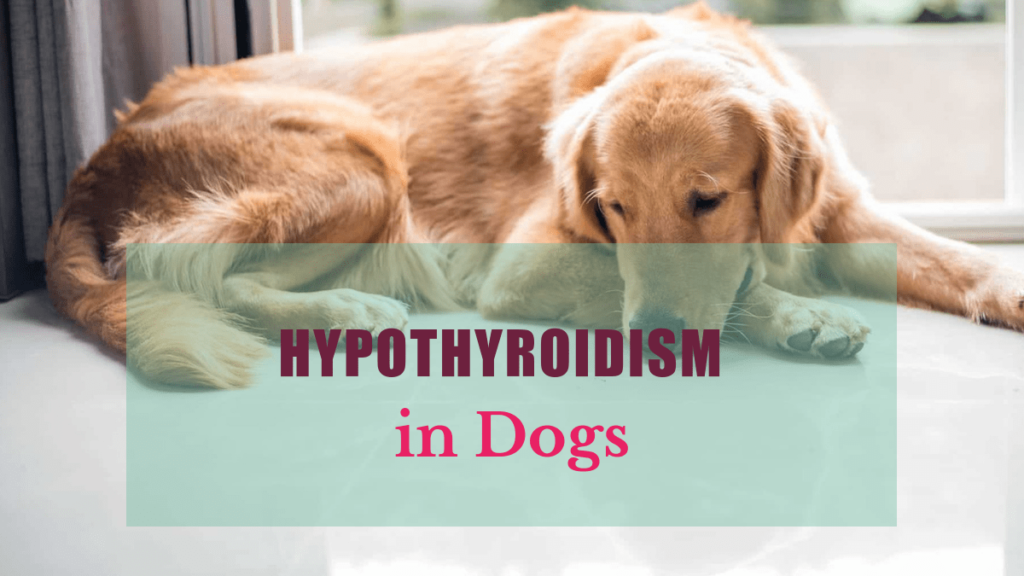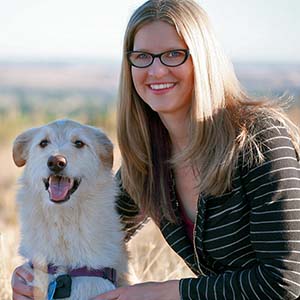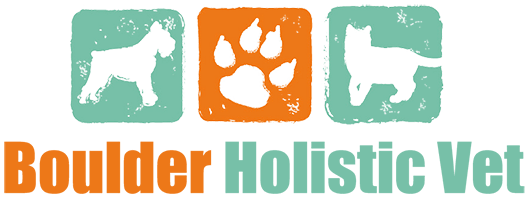Hypothyroidism in Dogs

Hypothyroidism (underactive thyroid) in dogs is a common disease and is also one of the most overdiagnosed diseases in small animal medicine. I must admit since graduating from veterinary school over 10 years ago, I have struggled to accurately diagnose dogs with hypothyroidism. There is little agreement among veterinary internists and endocrinologists when it comes to diagnosing an underactive thyroid. Veterinarians are left with conflicting information and with uncertainty. This leads to many dogs that don’t truly have the disease being treated for hypothyroidism and some dogs that have the disease being left untreated.
In this article, I am going to help you advocate for your dog to ensure that they have the best chance for an accurate diagnosis. We will go over the symptoms of hypothyroidism, the laboratory tests you should use to make a diagnosis and how to treat your dog with a holistic approach.
Symptoms
Common symptoms of hypothyroidism include lethargy/dullness, weight gain, thinning of the hair coat, increased triglycerides in the blood, low red blood cell count, lower body temperature and sometimes seizures. These symptoms are vague and can be caused by many other disease processes. This is why accurate testing is so important.
Laboratory Testing
Thyroid tests are little bit of alphabet soup. So, if you don’t care for the details, just skip ahead to the next paragraph where I provide you my recommendations. A comprehensive thyroid panel includes the following tests:
- Total T4
- Free T4
- Total T3
- Free T3
- TSH (Thyroid Stimulating Hormone)
- TgAA (Thyroglobulin Autoantibodies)
Does your dog need all of these? Not necessarily. I recommend this panel if I see symptoms of thyroid disease, or if my patient’s free or total T4 results are suspicious. These panels can be costly. While it would be great to get this information every year on all dogs over the age of 7, it’s probably not necessary.
The laboratory you use may play an important role in diagnosing your dog correctly. In my practice, I use Hemopet Diagnostics for my thyroid panels. I use this laboratory because they give me breed specific reference ranges. This has helped many of my patients avoid being misdiagnosed. Talk with your veterinarian about what lab they use and if they would be willing to do a comprehensive thyroid panel. The veterinary school at Michigan State University is also a reputable laboratory for accurate diagnosis of thyroid disease.
Holistic Treatment
Like most disease, taking a holistic approach can result in the best outcome for your pet. It is important to note that some hypothyroidism in dogs is due to an autoimmune process. This means that the body attacks the thyroid gland, causing it to product less thyroid hormone. It’s poorly understood how many dogs suffer from this form of hypothyroidism. This is why checking for TgAA, or thyroid autoantibodies, is so important. This lab value checks to see if your dog’s body is attacking its own thyroid gland. Having an autoimmune disease changes the way your pet is vaccinated and treated in the future.
The following is my treatment protocol for treating hypothyroidism:
- Supplement with T4 (levothyroxine). Your dog’s thyroid is no longer able to make adequate levels of thyroid hormone. This hormone is important at the cellular level. It is important that we replace this hormone for optimal total body health. While levothyroxine is a synthetic hormone, it is extremely effective in the vast majority of dogs. There are alternatives, including Armour Thyroid, which is a pig derived glandular T3/T4 supplement. I reserve this for dogs that don’t respond well on levothyroxine. Because Armour Thyroid is derived from pig thyroid, it is extremely difficult to regulate. There are many nutraceutical companies that make glandular thyroid supplements. These alone are not adequate replacements for thyroid hormone.
- Diet. A species appropriate, minimally processed diet is the best for optimal health. This is no different with thyroid disease. It’s important that the diet you feed be balanced and have appropriate levels of iodine. Many pet parents make the mistake of giving too much iodine, which can aggravate thyroid disease. Check out this article on the best diets to feed dogs here.
- Probiotics. Taking care of your dog’s intestinal health is important, especially if they hypothyroidism is due to autoimmunity. Giving your dog a daily probiotic or fermented foods can be very helpful. This is especially important after giving antibiotics. Want to learn more about probiotics for pets? Check out this article.
- Supplements. Supplements that help decrease inflammation can be very helpful. I like to use fish oils, turmeric and other anti-inflammatory herbs to help quell inflammation.
Treatment Tips
- Your veterinarian will want to retest your dog’s blood 4-6 weeks after starting thyroid hormone or changing doses. This blood draw should occur 4-6 hours after the morning dose of thyroid medication. Make sure you schedule your appointment in that time range.
- It is recommended that you give your dog their thyroid medication 30-60 minutes before a meal. For many people, this may be unrealistic. Be sure to choose a way to administer the medication and be consistent. If you are giving the medication with food, be sure to tell your veterinarian. My own dog gets his levothyroxine with food and has great blood levels. This may not work for all dogs.
- Some dogs are sensitive to the brand of levothyroxine. This is a rare occurrence but may be important if your dog is not responding to therapy.
As always, work with your veterinarian to find the best diagnostic and treatment plan for your pet. Thyroid disease is a treatable condition and doesn’t have to slow your dog down!
Wishing you and your pet health and happiness!


By signing up for our newsletter, you consent to recieve emails and SMS messages for marketing purposes, and agree to our Privacy & Cookie Policy. We will never sell/share your information!

Hey there, I’m Dr. Angie
I help empower pet owners to become medical advocates for their pets.
Let's get started!
What would you like to read?










9 thoughts on “Hypothyroidism in Dogs”
Not holistic. Go ahead and block this comment too. Why I research vets who claim to be “holistic” carefully.
Can’t call yourself holistic if you prescribe Synthroid, etc. All the top holistic vets I know of prescribe Armour because it’s complete. I take it too and have for decades.
Hi Susan!
Great comment! I use Armour when needed. Treating thyroid disease in dogs can be nuanced and I appreciate your dedication to your research. As someone who also has hypothyroidism, I appreciate that supplementation is a very individual process. I did poorly on armour thyroid but have been beautifully managed on tirosint. The most important guide when managing thyroid disease is a dog’s clinical signs. Some dogs may look poorly on a thyroid panel but may be doing well with symptom management. Other dogs may look great on paper and can be suffering. Keep an open mind, listen to your pup and remember there are more tests than TSH. It’s ok if you don’t think I am a holistic vet!
Sending love,
Dr. Angie
Thanks for your reply. I guess I sounded off a bit. It’s frustrating to see my dog have the same condition as I have had all these years (but at least I have the meds on hand) How long after initial treatment begins does a dog start to improve, energy-wise, etc. So frustrating that I was the only one to figure this out- I guess because I have had it too. But better late than never!
Hi Susan,
Thyroid disease can be so frustrating! When I have the right medication and dose, most dogs feel better within a month. There may be other factors contributing to low energy. I like to rule out pain and gastrointestinal disease that is interfering with nutrient absorption.
It’s hard to feel like you have to advocate for yourself and your pet without support. Keep up the good work!
Hugs,
Angie
Gracie is a mini Lemon Beagle. She weighs about 18lbs. She was put on Thyro Tabs 0.1 mg (one in the morning and 1 at night) about a month and a half ago. She did well the first month. After starting the second month, she has started drinking an excessive amount of water. Three times the amount she should be drinking. I am concerned the dose is too high.
Hi Nancy,
I am so sorry for this delayed response!
How is Gracie doing now?!
Warmly,
Claire
My great dane recently started having breathing issues and drinking water more frequently too. I was considering dedicated thyroid in small dose instead of levothyroxine
Definitely hope you did this. Desiccated thyroid is far superior.